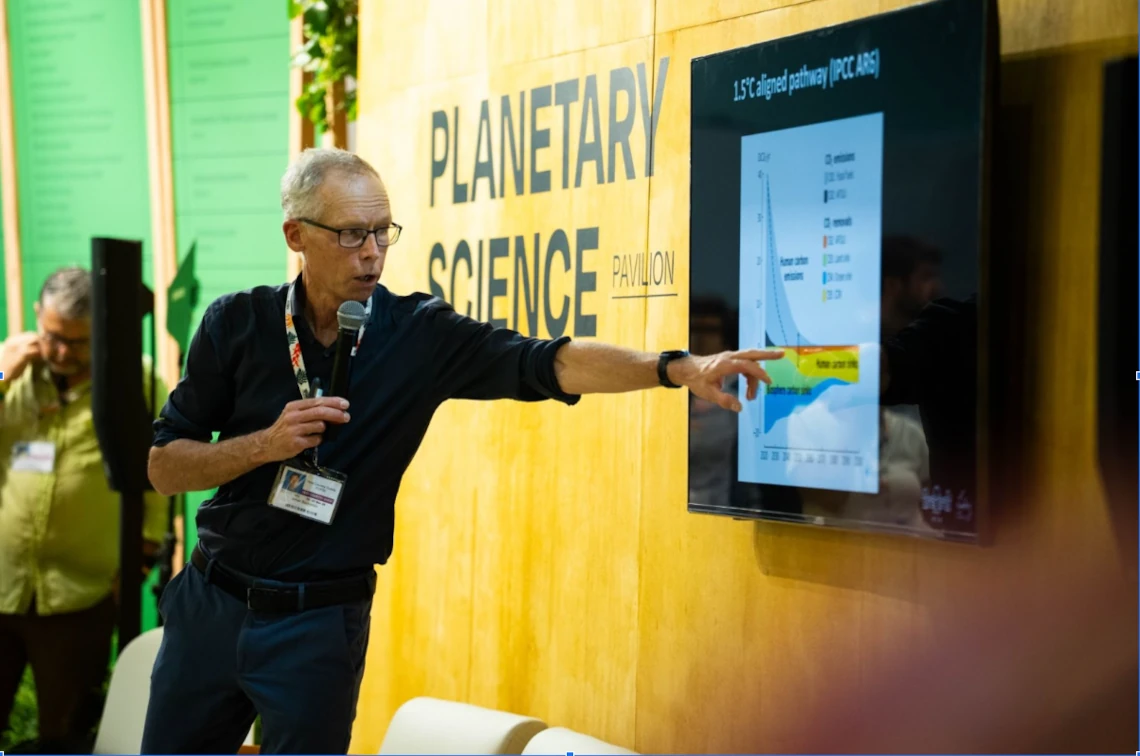Co-chairs Johan Rockström and Carlos Nobre set the tone in a concise introduction: this is a space for rigorous evidence, respectful dialogue across knowledge systems, and practical guidance for decision-makers navigating a rapidly closing window.
The Planetary Science Pavilion opened its doors with a clear intention: put the best available science where it matters most: inside the negotiations. Co-chairs Johan Rockström and Carlos Nobre set the tone in a concise introduction: this is a space for rigorous evidence, respectful dialogue across knowledge systems, and practical guidance for decision-makers navigating a rapidly closing window.
On Opening Day, the Planetary Science Pavilion hosted four sessions under the shared theme “State of the Planet”, setting the scene for the days ahead. Across the panels, scientists emphasized a clear and urgent message: the Earth’s systems are changing faster than anticipated, and the window for stabilizing the climate is narrowing—yet the knowledge and solutions needed for recovery already exist.
The sessions highlighted accelerating planetary warming, weakening natural carbon sinks, and the growing likelihood of crossing ecological tipping points in forests, oceans, and cryosphere regions. At the same time, speakers stressed the pathways still available to prevent the worst outcomes—from rapidly phasing out fossil fuels and protecting tropical forests to scaling carbon removal technologies and strengthening planetary governance. Together, these discussions grounded COP30 negotiations in the latest climate science, planetary health evidence, and systemic policy insights.
Session 1: 10 New Insights in Climate Science:
Future Earth and The Earth League presented the 2025/26 10 New Insights in Climate Science, showing that warming is accelerating, natural carbon sinks are weakening, and current pledges fall short. The science indicates emissions must fall ~5% per year this decade, with carbon removal scaled alongside rapid fossil phase-out and nature protection.
Session 2: The Earth’s Energy Imbalance:
Karina von Schuckmann outlined the growing Earth energy imbalance—the planet is absorbing more heat than it releases, driving record ocean warming and extreme events. This indicator reflects the underlying physics of planetary heating, not just temperature spikes.
Session 3: Global Tipping Points 2025:
Tim Lenton and colleagues shared new findings on tipping points, showing rising risks at 1.5°C but also opportunities for positive tipping to accelerate transitions—if policy, finance, and social action shift together.
Session 4: Planetary Health Check: From Overshoot to Recovery:
In conversation, Johan Rockström, Carlos Nobre, Xiye Bastida, Cristiane Gomes Julião, and Jean Oelwang emphasized that climate, biodiversity, and human well-being are one system. Recovery requires holistic action: end fossil fuels, protect biocultural diversity, and restore forests and oceans.
The conversations that mattered
Throughout the day, several themes echoed across panels and Q&A: speed and scale are now the decisive factors for meaningful action; nature must be treated as essential infrastructure for climate stability and resilience; and carbon dioxide removal must complement—not delay—rapid fossil fuel phase-out. These discussions reinforced that climate, biodiversity, and human well-being are deeply interconnected, and that solutions already exist — they now need to be deployed faster and together.
Across all discussions, scientists delivered a unified message: Earth’s systems are destabilizing faster than expected, but we still have the knowledge and tools to recover — if action accelerates.
About the Planetary Science Pavilion
The Planetary Science Pavilion is the first COP Presidency-mandated space dedicated to bringing rigorous, independent science directly into climate negotiations. Co-chaired by Johan Rockström (Potsdam Institute for Climate Impact Research) and Carlos Nobre (Science Panel for the Amazon / Planetary Guardian), the Pavilion brings together leading scientists, Indigenous knowledge holders, youth leaders, policymakers, and civil society actors to ground decision-making in the best available evidence on Earth system stability and planetary health.
Located in the Blue Zone at COP30 in Belém (PVB47), the Pavilion serves as a hub for presenting emerging research, facilitating high-level dialogue, and connecting science with policy to inform a safe, just, and livable future for all.


